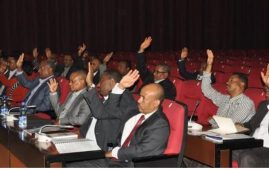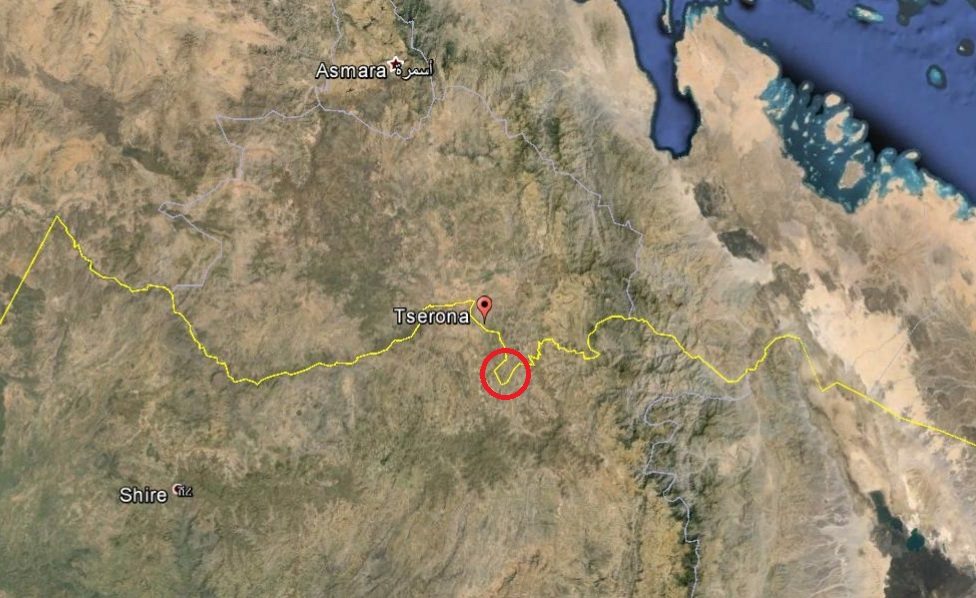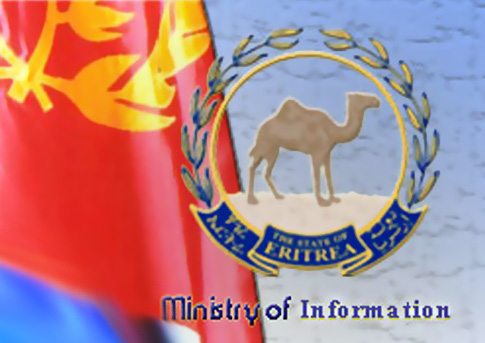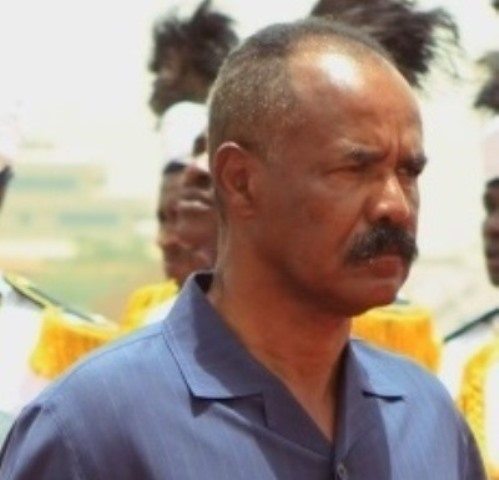The Brussels based International Crisis Group(ICG) released analyses of the Eritrean State in its African Report N°163 of Sept 21/2010. The 37 pages report, titled ‘ERITREA: THE SIEGE STATE’, is fairly informative of the worrisome political and socio-economic conditions and the regimes destabilizing role in the region.
 However, some level of naiveté is evident in its prescription to save Eretria from becoming a failed state. Paradoxically, it recommended the international community to reward the Eritrean regime with ‘development assistance and improved trade links’. Though, the report explicitly notes that ‘the willingness of potential friends to consider the legitimacy of at least some of its concerns is diminished by Eritrea’s unwillingness to demilitarize its foreign policy and to make concessions on any level.’
However, some level of naiveté is evident in its prescription to save Eretria from becoming a failed state. Paradoxically, it recommended the international community to reward the Eritrean regime with ‘development assistance and improved trade links’. Though, the report explicitly notes that ‘the willingness of potential friends to consider the legitimacy of at least some of its concerns is diminished by Eritrea’s unwillingness to demilitarize its foreign policy and to make concessions on any level.’
One way to appease the Eritrean regime and save the state from a full-blown crisis is, according to the report, putting pressure on Ethiopian government. This recommendation provoked serious criticism from Ethiopia’s Ministry of Foreign Affairs, on its weekly press statement, ‘A Week in The Horn’, of Oct 01/2010. The press statement is re-posted here following the Executive Summary of ICG’s Report.
ERITREA: THE SIEGE STATE
Africa Report N°163 – 21 September 2010
Executive Summary 
Eritrea has been deeply troubled since independence in 1991. Following the devastating war with Ethiopia (1998-2000), an authoritarian, militarized regime has further tightened political space, tolerating neither opposition nor dissent. Relations are difficult with the region and the
wider international community. At African Union (AU) behest, the UN Security Council imposed sanctions in 2009 for its support of the Somali Islamic insurgency. It has become, in effect, a siege state, whose government is suspicious of its own population, neighbours and the wider world. Economically crippled at birth, it is a poor country from which tens of thousands of youths are fleeing, forming large asylum-seeking communities in Europe and North America. But Eritrea is an extreme reflection of its region’s rough political environment, not its sole spoiler. More effort to understand the roots of its suspicions and greater engagement rather than further isolation would be a more promising international prescription for dealing with the genuine risks it represents.
The militarism and authoritarianism which now define the political culture have their roots in the region’s violent history. The 30-year war of independence was part of a network of conflicts which devastated northeast Africa. The real significance of that legacy has only become clear in the last decade, as President Isaias Afwerki and a small cohort of ex-fighters have strengthened their grip on power, while suppressing social freedoms and economic development in favour of an agenda centred on an obedient national unity and the notion that Eritrea is surrounded by enemies. Isaias’s supporters, diminishing in number, assert that only he has the vision to guide it through difficult times; the growing ranks of his critics argue that he has hijacked the nation-building process; betrayed the sacrifice of hundreds of thousands who achieved and defended independence, and brought ruin to the country.
Conditions are worsening dramatically. Since the 2001 crackdown that ended a brief period of public debate, jails have been filled with political prisoners and critics, religious dissidents, journalists, draft evaders and failed escapees. Isaias uses the standoff with Ethiopia to justify severe internal discipline and military adventures across the region. Ethiopia has reneged on part of the Algiers Agreement that ended the war, in particular by not accepting what was to have been a special commission’s binding decision on the border. The Security Council’s failure to compel compliance reinforced the sense in Asmara that the international community is inherently hostile. Eritrea subsequently placed restrictions on UN peacekeepers that led to their withdrawal in 2008 from the demilitarised zone between the belligerents, citing total lack of cooperation. Isaias’s foreign policy became even more fixated on forcing Ethiopia to accept the border decision, with proxy warfare rather than conventional diplomacy the favoured tool.
Militarised politics has spilled into foreign policy, the latter frequently involving armed responses and aggressive adventurism at the expense of conventional diplomacy. To date, Eritrea has fought, directly or indirectly, with Ethiopia, Yemen, Djibouti and Sudan and involved itself in various ways in the conflicts in eastern Sudan, Darfur and Somalia. While it asserts that it is pursuing legitimate national security interests and lambasts the U.S. in particular for intervening in the affairs of others, the aggressive approach and abrasive tone have left it increasingly isolated. The willingness of potential friends to consider the legitimacy of at least some of its concerns is diminished by Eritrea’s unwillingness to demilitarise its foreign policy and to make concessions on any level.
The economy has been shattered by the vagaries of regional rainfall, the state’s destruction of the private sector and the huge costs of military mobilisation. Society more broadly is under enormous strain. Remarkably, there have not yet been serious protests, but pressure is building, both inside the borders and in the extensive diaspora, whose remittances have been a major financial support. A range of external opposition groups – though still deeply divided – are lining up against the regime.
To avoid a fresh crisis in the Horn of Africa, the international community and the Eritreans alike will need to demonstrate a new level of imagination and flexibility. It is vital that the international community engages with Eritrea, politically and economically, and rigorously assesses the country’s internal problems as well as its external pressures. Development assistance and improved trade links should be tied to holding long-promised national elections and implementing the long-delayed constitution. At the same time, in particular the UN Security Council should pressure Ethiopia to accept the border ruling. All this is necessary to prevent another failed state from emerging in the Horn. That outcome is otherwise distinctly possible given the widespread lack of support for the government within the country and the deteriorating state of the army, whose ability to either sustain Isaias Afwerki’s regime or to successfully manage regime transition is increasingly questionable.
Nairobi/Brussels, 21 September 2010
[Download the Full Report HERE.]
Ethiopia’s Ministry of Foreign Affairs
Weekly Press Statement
’A WEEK IN THE HORN’
Preventing “a failed state”: the Responsibility of Eritrea’s Leadership 
Last week we welcomed the fact that the International Crisis Group had at least begun to take a close look at the increasingly worrying situation in Eritrea which, the report suggested, was lurching towards the status of a failed state. We would obviously, like all of Eritrea’s neighbors, prefer this not to happen. The possible ramifications of such a disaster would be frightening for Eritreans and for the rest of the Horn of Africa, even if it would bring an end to the perennial efforts of the Eritrean government to destabilize the region and its neighbors.
However, the ICG’s suggestion that the way to avoid Eritrea’s collapse into the status of a failed state is to put pressure on Ethiopia, to resolve the border problem between Eritrea and Eritrea, is something that certainly needs urgent correction. This is paralleled by the ICG’s implicit acceptance of Asmara’s view that the international community is inherently hostile to Eritrea. These are comments that demonstrate a failure to understand either the roots of Eritrea’s foreign and domestic policies, or of the aims and attitudes of President Isaias.
There are two major points here. One is that Eritrea’s problem with Ethiopia is of its own making; secondly, from Eritrea’s perspective it is clear that there is no longer a border issue if indeed there ever was. Eritrea has made it quite clear it is not prepared to normalize relations with the present government in Ethiopia.
The ICG warns that Eritrea might become a failed state unless pressure is put on Ethiopia to resolve the border problem. Let us not forget that the problem is actually of Eritrea’s making in the first place. It was Eritrea that invaded Ethiopia in May 1998 in defiance of the UN Charter as the Claims Commission made clear; it was Eritrea that refused to respond to Ethiopia’s acceptance of the Boundary Commission’s Decisions in November 2004; it was Eritrea which systematically dismantled the Cessation of Hostilities Agreement and elements of the Algiers Agreement; it was Eritrea that forced out the UN Mission (UNMEE) whose job was to monitor the Temporary Security Zone between the two armies, and provide for the security for demarcation.
In fact, according to the Peace Agreement, UNMEE’s presence is a pre-requisite for demarcation. Equally, demarcation depends upon a cessation of hostilities, and Eritrea’s deliberate abrogation of the Cessation of Hostilities Agreement means that hostilities have continued as indeed Eritrea has demonstrated with its continued efforts to destabilize Ethiopia.
None of this has anything to do with Ethiopia. It could all be resolved by Eritrea’s President Isaias overnight – if he wished to do so; if he was prepared to swallow the blow to his pride caused by Eritrea’s defeat in June 2000. He is not, even though arrogance and pride are scarcely a sound basis for either internal or external policy. To be prepared to think again, to admit errors, still appears to be a psychological barrier for President Isaias.
The excuse so often made for Eritrea, and so often quoted by Eritrean officials – frustration at Ethiopia’s failure to demarcate – simply cannot hold water, and constant repetition adds nothing to its value. In the first place, as we have repeatedly noted, Ethiopia has long accepted the Boundary Commission’s Decisions. It is Eritrea which has prevented demarcation of the border according to international norms, and which has repeatedly refused any dialogue to normalize relations.
Equally to the point, Eritrea’s destabilization activities and aggression in the region started long before 2002, the year the Boundary Commission announced its decisions. Conflicts with Sudan, Djibouti, Yemen and Ethiopia were all started by Eritrea in the 1990s. This policy has continued even after the defeat of Eritrea’s aggression against Ethiopia as Eritrea again demonstrated in 2008 when its troops invaded Djibouti.
Similarly, Eritrea’s more recent claim that Ethiopia was occupying Eritrean territory is, as Ethiopia noted in its right of reply to Eritrea’s statement at the UN General Assembly, a figment of imagination. Virtual demarcation, of course, has no legal standing and as the Boundary Commission itself noted, until the boundary is actually demarcated the boundary accepted by Ethiopia in June 2000 remains the only valid one. As Ethiopia has consistently said the most important task remaining is demarcation on the ground to ensure sustainable peace. Ethiopia is ready to sit and discuss all issues with Eritrea; Eritrea persistently refuses to hold any dialogue or any discussions to normalize relations.
There really is no excuse for Eritrea’s behavior since independence, its consistent use of aggression as a central element in foreign policy, and more recently its efforts to use terrorism. Certainly, however, more attention should be paid to Eritrea, and we would not disagree with the point that the Eritrean government is “suspicious of its own population, neighbors and the wider world.” Having said that, however, it is very clear the root of the problem lies with the government and leadership of Eritrea which holds these suspicions, suspicions for which there is no independent or impartial evidence.
In fact, as Ethiopia has been made only too aware, the problem between Eritrea and Ethiopia now has nothing to do with the border. Eritrea has made the issue one of attempting to overthrow the government of Ethiopia, of regional power and hegemony, and the pride of its president. Ethiopia has consistently tried to move towards normalization of relations during the last six years. Eritrea has, as consistently, deliberately and definitely, refused to countenance the idea. As a result there has been no peace and reconciliation, no resumption of trade, no discussion of border demarcation issues, and no cooperation on security. In a word there has been no cessation of hostilities, and without that there can be no boundary demarcation. Ethiopia is well aware that it would gain nothing by any Eritrean slide into anarchy and disorder, but it is the Eritrean government which controls this, not Ethiopia or any of its alleged policies, nor even the UN, the US or the CIA as the Eritrean leader so frequently claims.
While the ICG report does put considerable emphasis on Eritrea’s domestic problems, its conclusions almost appear to be part of the government’s campaign to deflect the international community’s attention away from Eritrea’s destabilizing activities, offering an excuse for the regime to get away with the UN Security Council sanctions. “It is inadequate and unhelpful to portray Eritrea as the regional spoiler.” It is no coincidence that Eritrean diplomats are currently busy trying to link their role in Somalia and throughout the region, and what they call ‘Ethiopia’s illegal occupation’ of Eritrean ‘sovereign’ territory. They are making an attempt to recast the regime in Asmara as having a potentially constructive role to play in bringing about a peaceful resolution of conflict in the region, and more particularly in Somalia.
With its comments on border issues and its acceptance of Eritrea’s view of the world, the ICG appears to support this, even if it differs over the government’s internal views. As we have previously noted this hasn’t prevented the regime sending boatloads of troublemakers to Ethiopia and arms to Somalia just as it was apparently rolling out a red carpet for those who naively believe it is possible to change Eritrean government policies. The ICG’s dismissal of Eritrea’s destabilization activities suggests the report is actually designed to sell the insidious agenda of getting the Eritrean government off the hook of UN Sanctions.





